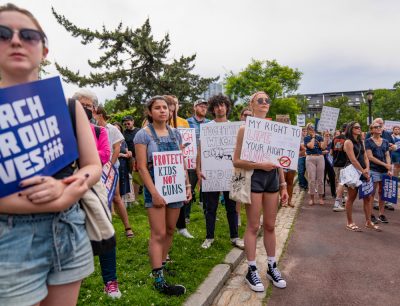
Protests on abortion access, gun reform, teacher wages and climate change all took place during the past year in Boston, making the city a microcosm of larger national movements and a champion for local issues.
National tragedies inspired Boston residents to take action in an unprecedented year for mass shootings. Last May, the back-to-back tragedies in Buffalo, New York and Uvalde, Texas provoked an outcry from the community.
Ruth Zakarin, executive director of the Massachusetts Coalition to Prevent Gun Violence, said her organization was involved in the vigil held at Copley Square to honor the 19 children and two teachers killed in Texas.
The coalition also supported other organizations, such as Teen Empowerment Boston, to organize movements to address gun violence, including March for Our Lives rallies at Columbus Park and Harvard University. Another rally was organized by college students and held at the Boston Common following the shooting at Michigan State.
“These public expressions of protest of accountability are really important for leaders and decision-makers to see,” Zakarin said. “It’s also really important that we show survivors that the community cares and is willing to work to make a difference.”
Students in the neighborhood of Dorchester staged a “die-in” demonstration to underscore community gun violence on May 17. Demonstrators lay motionless at a Burger King parking lot, an after-school hangout and hotspot for violence, according to the Boston Globe.
Climate change was another national issue that garnered city-wide action. With the next decade proving to be crucial in the fight against global warming, Boston activists turned their attention to Gov. Maura Healey’s administration to demand truth and action.
In September 2022, the climate action group Extinction Rebellion led an effort to block traffic to call for the government to ban new fossil fuel infrastructure, according to a press release. In February, the group occupied Healey’s office for the same purpose, resulting in 14 arrests according to Boston.com.
Almost three weeks ago, XR occupied the Massachusetts House gallery to halt proposed projects in several local communities, according to the Boston Globe.
Susan Lemont, XR activist and spokesperson, said the occupation achieved the intended effect of bringing attention to the climate crisis.
“Legislators started paying attention, and we started talking to them more,” Lemont said.
Lemont said XR is planning an ongoing protest at the State House, which aims to have protesters present whenever it is in session, starting June 5.
Youth activists have similarly spearheaded climate protests in the city. Boston’s chapter of Fridays for Future rallied at the State House in March to protest projects such as the Eversource substation, a project in East Boston believed to be environmentally unjust and located in a future flood zone.
Last summer, the Supreme Court’s overturn of Roe v. Wade sparked a series of protests advocating for the right to abortion, though the procedure remains legal in the state. On the day of the ruling, over a thousand protesters marched in downtown Boston to advocate for those in other states who would be affected, according to WBUR.
This was hardly the only pro-choice demonstration to occur since. On Oct. 8, 2022, Bostonians participated in a nationally recognized “Day of Action” for reproductive rights. The crowd flooded the State House lawn with bodies and signs in an attempt to inspire voting before November’s midterms, according to the Boston Globe.
Boston has kept pace with new developments — and declines — to reproductive freedom in the court. When the future of the legality of mifepristone, an FDA approved abortion medication, was uncertain, protests took place on Boylston street.
“Forced motherhood is female enslavement,” read stickers volunteers handed out, according to the Boston Globe.
At local universities, students have advocated for change on a range of issues.
Graduate students at Northeastern University and Boston University spent much of the last school year rallying for unionization in light of alleged lack of financial support. The death of a UMass Boston student at the hands of police incited outrage and protests demanding accountability.
At Harvard University, students protested the continued professorship of John Comaroff, an anthropology professor facing a lawsuit alleging sexual misconduct. Student activists staged a walkout, a march and most recently an occupation of University Hall, demanding the release of Comaroff and reformation of the school’s misconduct policies.
Educators fought their own battles, including the five-day strike by Woburn Teachers Association for better working conditions from Jan. 30 to Feb 5. Though the strike ended, WTA still faces opposition from the city government.
Amy Cardoso, an English teacher at Woburn Memorial High School, said she found out last week that there will be layoffs, positions will be cut and certain people will be moved into different programs within the school district.
“Many of us feel that that is direct retaliation for the strike, because we did our homework before we went on strike, and we made sure that we knew the city’s finances very well,” Cardoso said. “The city does have the money to avoid anybody losing their job.”
Cardoso said that despite feeling supported by the community, local businesses and parents, the lack of support from elected officials has created a rocky relationship between the WTA and city government.
“There may be discussions over the summer and early in the school year about how we move forward,” Cardoso said. “We do have a lot of healing to do here in Woburn.”
As history shows, when issues of national and local importance take place, Boston activists will carry on efforts to bring awareness to the issues they care most about.
“One of the ways that we show that this is not okay, this is not acceptable, we have to do something to change this narrative, is by showing up in numbers … to hold leaders and decision-makers accountable to making change,” Zakarin said.


















































































































